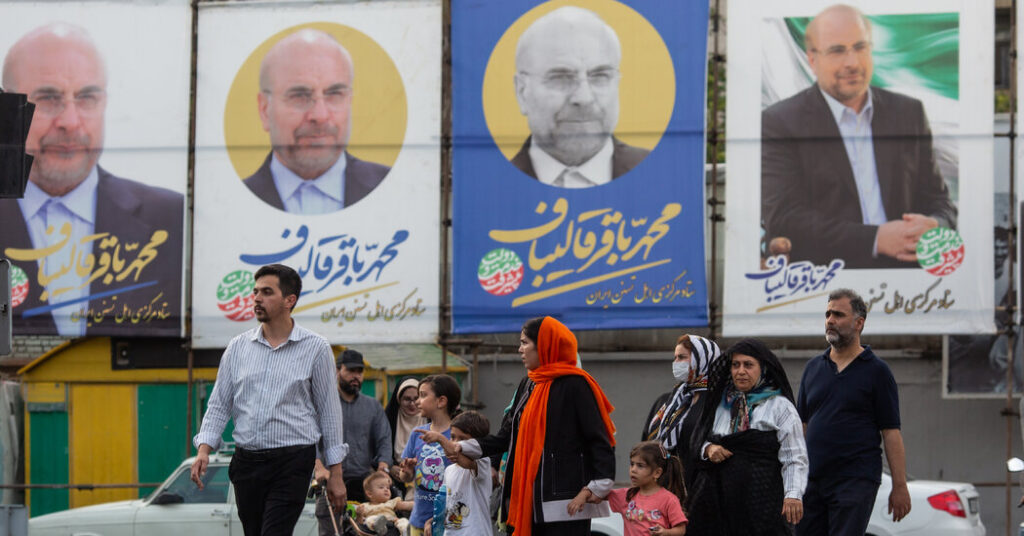A heart surgeon, a former Tehran mayor and a cleric implicated in executing political prisoners are among six candidates approved by officials to run in Friday’s election in Iran to succeed the president who was killed in a helicopter crash last month .
The candidate has abandoned Iran’s enforcement of hijab rules. They discussed U.S. sanctions that have contributed to the country’s economic woes and openly criticized the government in a series of debates, an unusual move in Iranian politics. Still, levels of voter apathy remain high in the country, and divisions among conservative leaders make predicting the outcome difficult.
Although Iran’s Supreme Leader Ali Khamenei has ultimate authority over major national affairs, the president sets domestic policy and can influence foreign policy.
Iran’s Guardian Council, a committee of 12 jurists and clerics, whittled down an initial list of 80 presidential candidates to six, disqualifying seven women, a former president and many other government officials. Four candidates are still in the race.
Two of the candidates – Amir Hussein Ghazizadeh Hashemi and Alireza al-Zakani – dropped out of the race to consolidate conservative votes. If no candidate wins a majority on Friday, a runoff will be held on July 5 between the two winners.
A pre-election poll by Iranian state television showed the reformist candidate Dr. Masoud Pezeshkian leading with about 23% of the vote. Mohammad Baqer Ghalibaf and Saeed Jalili received the conservative vote, with about 16% each. All fell short of the 50% majority needed to prevent a runoff.
Here’s what to know about the four presidential candidates still in the race.
Muhammad Bakr Ghalibaf
Mohammad Baqer Ghalibaf is the current speaker of parliament and former mayor of Tehran, the capital of Iran. The retired pilot and Islamic Revolutionary Guard Corps commander has unsuccessfully run for president several times.
He is also known for his role in the government’s violent crackdown on students, first in 1999 and then in 2003, when he was the country’s police chief and reportedly told authorities to fire live ammunition at students.
Ghalibaf faced accusations of financial corruption while serving as mayor of Tehran and accusations of moral hypocrisy over his family’s spending abroad. He denies the accusations.
The conservative politician, who is reportedly close to Khamenei, campaigned on promises to reduce government inefficiencies and criticized the government for losses due to ineffective oil sanctions.
Mehrzad Boroujerdi, an Iran expert and dean of the College of Arts, Sciences and Education at Missouri University of Science and Technology, said Ghalibaf was trying to portray himself as the “establishment candidate” during the debate. On the side of the elite, his position is that he is the only leader with experience and ability.
Massoud Pezeshkian
The only reformist candidate in the vote is Dr. Masoud Pezeshkian, a heart surgeon and veteran of the Iran-Iraq war who has served in parliament and as Iran’s health minister. After his wife and child died in a car accident, he raised his other children as a single father and never remarried. This identity, along with his status as an Azerbaijani, one of Iran’s ethnic minorities, endeared him to many voters.
Reformist candidates have been largely disqualified from the 2021 presidential election and March parliamentary elections. Experts say Dr. Pezeshkian’s inclusion may be an attempt to boost turnout among reformist voters and Iranians who are boycotting parliamentary elections in March. The government considers high voter turnout crucial to the legitimacy of the election.
Dr Pezeshkian is backed by former president Mohammad Khatami, who has expressed a willingness to engage in nuclear talks with the West and views the debate as an economic issue.
Saeed Jalili
Said Jalili is an ultraconservative former nuclear negotiator who lost a leg in the Iran-Iraq war and is known as a “living martyr.” He leads the far-right Pedari party, which represents the country’s strongest ideological views on domestic and foreign policy.
Jalili said he did not believe Iran needed to negotiate with the United States to achieve economic success. Borujedi said that although he may be the closest candidate to Khamenei, he has presented to the public a “completely unrealistic” assessment of Iran’s economic capabilities.
“He is firmly opposed not only to any nuclear deal, but also to any form of opening up by the West,” Mr. Borujedi said.
Mustafa Pulmohammadi
Mustafa Pulmohammadi is the only cleric to participate in this election. A former counterintelligence chief, he was a member of the committee that oversaw the execution of thousands of political prisoners at Evin prison in 1988.
He bluntly stated in a debate that Iran’s biggest problem is that the government has lost the support of the people and cannot stimulate people’s participation in elections.
Pourmohammadi has been critical of Iran’s support for Russia during its ongoing invasion of Ukraine and said Iran does not benefit enough from providing weapons to the Kremlin.
He also invoked former President Donald J. Trump’s name on the campaign trail. “Wait a minute, you’ll see what happens when Trump comes,” he said during a recent televised debate. “We have to be ready for negotiations.”
In one of Purmohammadi’s campaign posters, he and Trump face each other, gazing at each other. “The only person who can stand in front of Trump is me,” it read.

